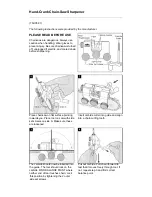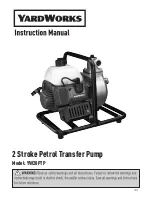
17
Instruction Manual
BC 800 R Series
EN
Date: 02-09-2012
1. General
1.1 Introduction
The microcontroller controlled battery chargers of the
BC 800 R series are designed for wall mount and work
with an airflow based cooling.
They are intended to charge different type of lead
batteries. The three-stage, temperature compensating
charging procedure allows fast, complete and careful
charging of the batteries.
Furthermore, the devices feature a power supply mode
where the output voltage becomes adjustable.
The power output is protected against false polarity
connection, is short-circuit-proof and overload-proof.
For protection of the loads, the devices also feature an
overvoltage protection (OVP). At an overtemperature
(OT) event, the power output will be switched off until
the unit has cooled down and automatically switch on
again.
1.2 Visual check
After receipt, the unit has to be checked for signs of
physical damage. If any damage is found, the unit may
not be operated. Also contact your dealer immediately.
1.3 Scope of delivery
1 x Battery charger unit
1 x Printed user manual
1 x Temperature sensor LM335Z (10mV/K)
1 x Mounting kit
2. Installation
2.1 Mounting
The device is designed for wall mount. It is required
to mount it in a way that allows unimpeded air flow
through the ventilation slots. Take care for plenty of
space (at least 15cm) below and above the device in
order to ensure proper cooling. The included mounting
kit contains strips that can be attached to the device
in vertical or horizontal position. These strips have drill
holes for screws with up to 5mm thread.
Also see drawing on page 21.
2.2 Mains connection
All models are equipped with an active PFC (power
factor correction) and a wide range input. It can be
operated at AC input voltages from 90V to 264V and
mains frequencies of 45Hz up to 65Hz.
The connection is done at the 3-pole terminal „Power
Input“ on the front plate. It must only be carried out by
trained technical personnel.
Clamping procedure:
Main focus lies on an appropriate cross section of the
mains lead, as well as the fact that the device does not
feature a power switch. The mains input is fused by a
standard 5x20mm fuse, type T16A, which is located in
the fuse holder on the front plate.
2.3 Sense connection
The remote sense inputs are located on the front and
are of type press & clamp. Cable cross section goes
from 0.08mm² (28 AWG) to 4mm² (12 AWG). If possible,
use cable end sleeves.
Clamping procedure:
2.4 DC output connection
The battery is connected to the DC output terminals
on the front using leads with appropriate cross section
and 6mm ring lugs. The device can produce dangerous
voltages. Thus the output must be covered with the
supplied plexi glass cover (only on models >80V)when
working with the device.
2.5 Analogue interface connection
See section „5.9 The analogue interface“.
About the device
Summary of Contents for BC 800 R Series
Page 2: ......
Page 9: ...9 Bedienungsanleitung BC 800 R Serie DE Stand 09 02 2012 4 1 Ansichten und Maße Beschreibung ...
Page 27: ......
Page 28: ......












































